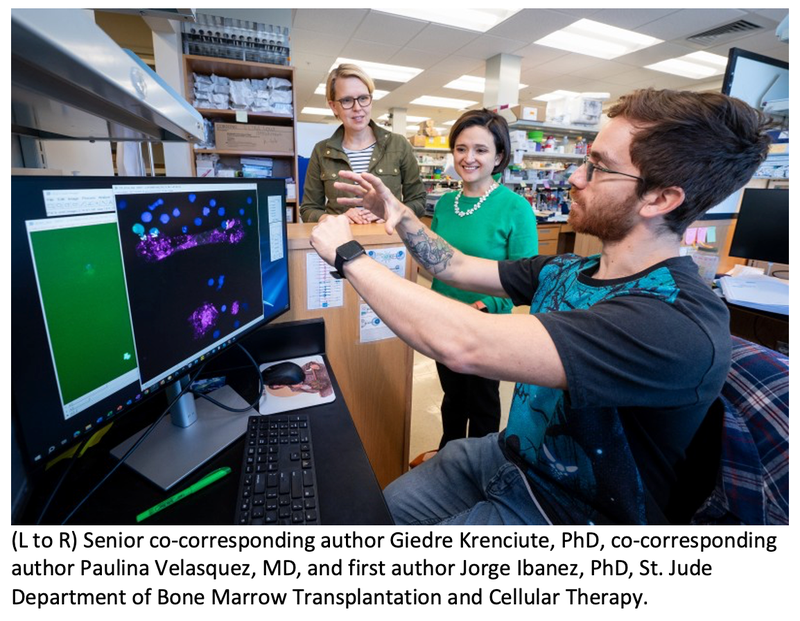St Jude Researchers Validate Target for CAR-T Cell Therapy in Brain and Solid Tumors
 Scientists at St. Jude Children’s Research Hospital validated a cellular immunotherapy target called 78-kDa glucose-regulated protein (GRP78) in proof-of-principle experiments. The group also discovered a resistance mechanism whereby some tumors trick the cancer-killing immune cells into expressing GRP78, thereby turning off the immune cells or causing them to be killed, too. The research, which has implications for developing immunotherapy for the broad range of difficult-to-treat brain and solid tumors expressing GRP78, was published today in Cell Reports Medicine.
Scientists at St. Jude Children’s Research Hospital validated a cellular immunotherapy target called 78-kDa glucose-regulated protein (GRP78) in proof-of-principle experiments. The group also discovered a resistance mechanism whereby some tumors trick the cancer-killing immune cells into expressing GRP78, thereby turning off the immune cells or causing them to be killed, too. The research, which has implications for developing immunotherapy for the broad range of difficult-to-treat brain and solid tumors expressing GRP78, was published today in Cell Reports Medicine.
Reprogramming a patient’s immune cells to target cancer has been successful against leukemia but not brain or solid tumors. These reprogrammed cells, called chimeric antigen receptor (CAR) T cells, target a specific protein expressed on cancer cells but not healthy ones. This targeting enables CAR T–cell immunotherapy to kill the tumor while leaving healthy tissues unharmed selectively. One difficulty that has stymied the success of CAR T cells in brain and solid tumors is the challenge of identifying a good target for these cancers.
“We found GRP78 is a great CAR T–cell target,” said senior co-corresponding author Giedre Krenciute, PhD, St. Jude Department of Bone Marrow Transplantation and Cellular Therapy. “We saw high GRP78 expression in a multitude of brain and solid tumor types, including adult glioblastoma, diffuse intrinsic pontine glioma (DIPG), osteosarcoma, triple-negative breast cancer and Ewing sarcoma, but our therapeutic efficacy was variable.”
The researchers created GRP78-targeted CAR T cells that successfully killed many types of cancers in both cell and mouse models, though with significant variation. The researchers expected that higher levels of GRP78 (more protein to target) would make it easier for the CAR T cells to locate and destroy the cancer; however, that was not the case. The scientists found no relationship between the amount of GRP78 and the ability of the CAR T cells to kill cancer.
“We showed the conventional approach of targeting expression doesn’t mean an equal response,” said co-corresponding author Paulina Velasquez, MD, St. Jude Department of Bone Marrow Transplantation and Cellular Therapy. “GRP78 seems to be a special target that did not react as we expected, making it a promising but complicated candidate.”
“We expected two different tumors with the exact same level of antigen [GRP78] expression to be affected by the CAR T–cell therapy in the same way, but they aren’t,” said first author Jorge Ibanez, PhD, St. Jude Department of Bone Marrow Transplantation and Cellular Therapy. “Instead, we found certain tumor cell types were altering T-cell activation and T-cell GRP78 expression.”
Ibanez found that resistant tumor cell types were altering the CAR T cells. The tumor cells caused the GRP78-targeted CAR T cells to express GRP78 on the CAR T cells’ surface. The more GRP78 on the T cells, the less active they became, reducing their cancer-killing activity. In addition, CAR T cells that remained active targeted and killed their counterparts expressing GRP78 on their surface.
In effect, the resistant tumors were conning the CAR T cells. These tumors raised the flag of GRP78, saying, “I’m here,” and then convinced the approaching T cells to raise their own GRP78 flag. This tricked the CAR T cells into killing each other or giving up, leaving the tumor relatively unscathed.
Through these experiments, the St. Jude group unveiled the tricky biology of GRP78. The protein remains a tantalizing target, given its presence on many difficult-to-treat tumor types. Findings show scientists will need to expand their understanding of this newfound interaction with T cells to make viable GRP78-targeted immunotherapies. Still, if they can, these CAR T cells may be broadly applicable across a broad range of tumor cell types.
“We always need to find new targets to improve cancer treatment,” Krenciute said. “What we found from a biological perspective is that GRP78 has potential but is different from previous cancer-associated molecules. We showed that as scientists develop the next generation of CAR T–cell therapies, we need to recognize that not all targets are equal.”